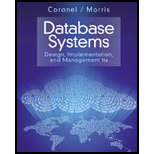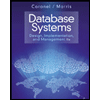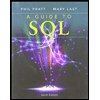
Database Systems: Design, Implementation, & Management
11th Edition
ISBN: 9781285196145
Author: Steven, Steven Morris, Carlos Coronel, Carlos, Coronel, Carlos; Morris, Carlos Coronel and Steven Morris, Carlos Coronel; Steven Morris, Steven Morris; Carlos Coronel
Publisher: Cengage Learning
expand_more
expand_more
format_list_bulleted
Concept explainers
Textbook Question
Chapter 11, Problem 11P
Problems 11–14 are based on the following query:
| SELECT | P_CODE, SUM(LINE_UNITS) |
| FROM | LINE |
| GROUP BY | P_CODE |
| HAVING | SUM(LINE_UNITS) > (SELECT MAX(LINE_UNITS) FROM LINE); |
What is the likely data sparsity of the LINE_UNITS column?
Expert Solution & Answer
Trending nowThis is a popular solution!

Students have asked these similar questions
Describe three (3) Multiplexing techniques common for fiber optic links
Could you help me to know features of the following concepts:
- commercial CA
- memory integrity
- WMI filter
Briefly describe the issues involved in using ATM technology in Local Area Networks
Chapter 11 Solutions
Database Systems: Design, Implementation, & Management
Ch. 11 - Prob. 1RQCh. 11 - What index should you create? Write the required...Ch. 11 - What is the focus of most performance-tuning...Ch. 11 - What are database statistics, and why are they...Ch. 11 - How are database statistics obtained?Ch. 11 - What database statistics measurements are typical...Ch. 11 - How is the processing of SQL DDL statements (such...Ch. 11 - In simple terms, the DBMS processes a query in...Ch. 11 - If indexes are so important, why not index every...Ch. 11 - What is the difference between a rule-based...
Ch. 11 - Prob. 11RQCh. 11 - What are some general guidelines for creating and...Ch. 11 - Prob. 13RQCh. 11 - Prob. 14RQCh. 11 - Prob. 15RQCh. 11 - SELECT SELECT EMP_LNAME, EMP_FNAME, EMP_AREACODE,...Ch. 11 - Problem 1 and 2 are based on the following query:...Ch. 11 - Using Table 11.4 as an example, create two...Ch. 11 - Problems 46 are based on the following query:...Ch. 11 - Problems 46 are based on the following query:...Ch. 11 - Prob. 6PCh. 11 - Problems 732 are based on the ER model shown in...Ch. 11 - Problems 732 are based on the ER model shown in...Ch. 11 - Problems 732 are based on the ER model shown in...Ch. 11 - Problems 732 are based on the ER model shown in...Ch. 11 - Problems 1114 are based on the following query:...Ch. 11 - Problems 1114 are based on the following query:...Ch. 11 - Problems 1114 are based on the following query:...Ch. 11 - Problems 1114 are based on the following query:...Ch. 11 - Problems 15 and 16 are based on the following...Ch. 11 - Problems 15 and 16 are based on the following...Ch. 11 - Problems 1721 are based on the following query:...Ch. 11 - Problems 1721 are based on the following query:...Ch. 11 - Prob. 19PCh. 11 - Prob. 20PCh. 11 - Problems 1721 are based on the following query:...Ch. 11 - SELECT SELECT P_CODE, P_DESCRIPT, P_PRICE,...Ch. 11 - Problems 2224 are based on the following query:...Ch. 11 - Problems 2224 are based on the following query:...Ch. 11 - Problems 25 and 26 are based on the following...Ch. 11 - Problems 25 and 26 are based on the following...Ch. 11 - Prob. 27PCh. 11 - Problems 27 and 28 are based on the following...Ch. 11 - Problems 2932 are based on the following query:...Ch. 11 - Problems 2932 are based on the following query:...Ch. 11 - Problems 2932 are based on the following query:...Ch. 11 - Problems 2932 are based on the following query:...
Knowledge Booster
Learn more about
Need a deep-dive on the concept behind this application? Look no further. Learn more about this topic, computer-science and related others by exploring similar questions and additional content below.Similar questions
- For this question you will perform two levels of quicksort on an array containing these numbers: 59 41 61 73 43 57 50 13 96 88 42 77 27 95 32 89 In the first blank, enter the array contents after the top level partition. In the second blank, enter the array contents after one more partition of the left-hand subarray resulting from the first partition. In the third blank, enter the array contents after one more partition of the right-hand subarray resulting from the first partition. Print the numbers with a single space between them. Use the algorithm we covered in class, in which the first element of the subarray is the partition value. Question 1 options: Blank # 1 Blank # 2 Blank # 3arrow_forward1. Transform the E-R diagram into a set of relations. Country_of Agent ID Agent H Holds Is_Reponsible_for Consignment Number $ Value May Contain Consignment Transports Container Destination Ф R Goes Off Container Number Size Vessel Voyage Registry Vessel ID Voyage_ID Tonnagearrow_forwardI want to solve 13.2 using matlab please helparrow_forward
- a) Show a possible trace of the OSPF algorithm for computing the routing table in Router 2 forthis network.b) Show the messages used by RIP to compute routing tables.arrow_forwardusing r language to answer question 4 Question 4: Obtain a 95% standard normal bootstrap confidence interval, a 95% basic bootstrap confidence interval, and a percentile confidence interval for the ρb12 in Question 3.arrow_forwardusing r language to answer question 4. Question 4: Obtain a 95% standard normal bootstrap confidence interval, a 95% basic bootstrap confidence interval, and a percentile confidence interval for the ρb12 in Question 3.arrow_forward
arrow_back_ios
SEE MORE QUESTIONS
arrow_forward_ios
Recommended textbooks for you
 Database Systems: Design, Implementation, & Manag...Computer ScienceISBN:9781305627482Author:Carlos Coronel, Steven MorrisPublisher:Cengage Learning
Database Systems: Design, Implementation, & Manag...Computer ScienceISBN:9781305627482Author:Carlos Coronel, Steven MorrisPublisher:Cengage Learning Database Systems: Design, Implementation, & Manag...Computer ScienceISBN:9781285196145Author:Steven, Steven Morris, Carlos Coronel, Carlos, Coronel, Carlos; Morris, Carlos Coronel and Steven Morris, Carlos Coronel; Steven Morris, Steven Morris; Carlos CoronelPublisher:Cengage Learning
Database Systems: Design, Implementation, & Manag...Computer ScienceISBN:9781285196145Author:Steven, Steven Morris, Carlos Coronel, Carlos, Coronel, Carlos; Morris, Carlos Coronel and Steven Morris, Carlos Coronel; Steven Morris, Steven Morris; Carlos CoronelPublisher:Cengage Learning Programming with Microsoft Visual Basic 2017Computer ScienceISBN:9781337102124Author:Diane ZakPublisher:Cengage Learning
Programming with Microsoft Visual Basic 2017Computer ScienceISBN:9781337102124Author:Diane ZakPublisher:Cengage Learning A Guide to SQLComputer ScienceISBN:9781111527273Author:Philip J. PrattPublisher:Course Technology Ptr
A Guide to SQLComputer ScienceISBN:9781111527273Author:Philip J. PrattPublisher:Course Technology Ptr Np Ms Office 365/Excel 2016 I NtermedComputer ScienceISBN:9781337508841Author:CareyPublisher:Cengage
Np Ms Office 365/Excel 2016 I NtermedComputer ScienceISBN:9781337508841Author:CareyPublisher:Cengage

Database Systems: Design, Implementation, & Manag...
Computer Science
ISBN:9781305627482
Author:Carlos Coronel, Steven Morris
Publisher:Cengage Learning

Database Systems: Design, Implementation, & Manag...
Computer Science
ISBN:9781285196145
Author:Steven, Steven Morris, Carlos Coronel, Carlos, Coronel, Carlos; Morris, Carlos Coronel and Steven Morris, Carlos Coronel; Steven Morris, Steven Morris; Carlos Coronel
Publisher:Cengage Learning

Programming with Microsoft Visual Basic 2017
Computer Science
ISBN:9781337102124
Author:Diane Zak
Publisher:Cengage Learning

A Guide to SQL
Computer Science
ISBN:9781111527273
Author:Philip J. Pratt
Publisher:Course Technology Ptr


Np Ms Office 365/Excel 2016 I Ntermed
Computer Science
ISBN:9781337508841
Author:Carey
Publisher:Cengage
SQL Basics for Beginners | Learn SQL | SQL Tutorial for Beginners | Edureka; Author: edureka;https://www.youtube.com/watch?v=zbMHLJ0dY4w;License: Standard YouTube License, CC-BY